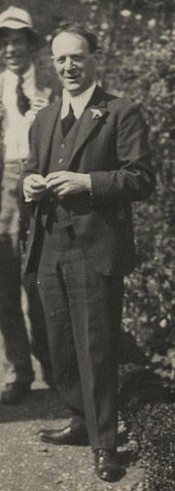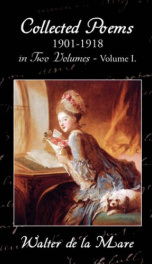De la Mare Walter

Walter John de la Mare (surname pronounced /ˈdɛləmɛər/, with stress on the de[1]), OM CH (25 April 1873 – 22 June 1956) was an English poet, short story writer and novelist, probably best remembered for his works for children and "The Listeners". He was born in Kent (at 83 Maryon Road, Charlton[2], now part of the London Borough of Greenwich), descended from a family of French Huguenots, and was educated at St Paul's Cathedral School. His first book, Songs of Childhood, was published under the name Walter Ramal. He worked in the statistics department of the London office of Standard Oil for eighteen years while struggling to bring up a family, but nevertheless found enough time to write, and, in 1908, through the efforts of Sir Henry Newbolt he received a Civil List pension which enabled him to concentrate on writing. De la Mare also wrote some subtle psychological horror stories; "Seaton's Aunt" and "Out of the Deep" are noteworthy examples. His 1921 novel, Memoirs of a Midget, won the James Tait Black Memorial Prize for fiction. De la Mare described two distinct "types" of imagination — although "aspects" might be a better term: the childlike and the boylike. It was at the border between the two that Shakespeare, Dante, and the rest of the great poets lay. De la Mare claimed that all children fall into the category of having a childlike imagination at first, which is usually replaced at some point in their lives. In his lecture, "Rupert Brooke and the Intellectual Imagination," he argued that children ". . . are not so closely confined and bound in by their groping senses. Facts to them are the liveliest of chameleons . . . They are contemplatives, solitaries, fakirs, who sink again and again out of the noise and fever of existence and into a waking vision." Doris Ross McCrosson summarizes this passage, "Children are, in short, visionaries." This visionary view of life can be seen as either vital creativity and ingenuity, or fatal disconnection from reality (or, in a limited sense, both). The increasing intrusions of the external world upon the mind, however, frighten the childlike imagination, which "retires like a shocked snail into its shell." From then onward the boyish imagination flourishes, the "intellectual, analytical type." By adulthood (de la Mare proposed), the childlike imagination has either retreated for ever or grown bold enough to face the real world. Thus emerge the two extremes of the spectrum of adult minds: the mind molded by the boylike is "logical" and "deductive." That shaped by the childlike becomes "intuitive, inductive." De la Mare's summary of this distinction is, "The one knows that beauty is truth, the other reveals that truth is beauty." Another way he puts it is that the visionary's source of poetry is within, while the intellectual's sources are without — external — in "action, knowledge of things, and experience," as McCrosson puts it. De la Mare hastens to add that this does not make the intellectual's poetry any less good, but it is clear where his own preference lies. A note to avoid confusion: The term "imagination" in the lecture "Rupert Brooke and the Intellectual Imagination" is used to refer to both the intellectual and the visionary. To simplify and clarify his language, de la Mare generally used the more conventional "reason" and "imagination" when discussing the same idea elsewhere. Writer Joan Aiken cites some of his short stories such as Almond Trees and Snow Mountains for their sometimes unexplained quality, which she also employs in her own work.[3] Come Hither was an anthology, edited by De la Mare, mostly of poetry with some prose. It has a frame story, and can be read on several levels. It was first published in 1923, and was a success; further editions followed. Alongside the children's literature aspect, it also provides a selection of the leading Georgian poets (from de la Mare's perspective). It is arguably also the best account of their 'hinterland', documenting thematic concerns and a selection of their predecessors. De la Mare was also a significant writer of ghost stories. John Clute comments that "in his long career, De la Mare seems to have published about 100 stories, of which about eighty-five have been collected. At least forty of these have supernatural content".[4] Many of De la Mare's ghost stories can be found in the collections Eight Tales, The Riddle and Other Stories, The Connoisseur and Other Stories, On the Edge and The Wind Blows Over. Walter John de la Mare was born to James Edward de la Mare, a clerk at the bank of England, and Lucy Sophia Browning (James' second wife), daughter of Scottish naval surgeon & author Dr Colin Arrott Browning. The assertion that Lucy was related to poet Robert Browning has been found to be incorrect. He had two brothers, Francis Arthur Edward and James Herbert ('Bert'), and four sisters Florence Mary, Constance Eliza, Ethel (who died in infancy), and Ada Mary ('Poppy'). De la Mare was known as Jack by his family and friends as he hated the name Walter. In 1892, De la Mare joined the Esperanza Amateur Dramatics Club, where he met and fell in love with Elfrida (Elfie) Ingpen, the leading lady. Elfie was ten years older than De la Mare. On August 4, 1899 De la Mare and Elfie, who was by then pregnant, were married. They went on to have 4 children - Richard Herbert Ingpen ('Dick'), Colin, Florence and Lucy Elfrida ('Jinnie') de la Mare. In 1940 Elfie was diagnosed with Parkinson's disease and spent the rest of her life as an invalid, eventually dying in 1943. From 1940 until his death, De la Mare lived in Montpelier Row, Twickenham, the same street where Alfred Tennyson, 1st Baron Tennyson had lived a century earlier.[5] In 1947 he suffered from coronary thrombosis and died of another in 1956. De la Mare's play "Crossings" has an important role in Robertson Davies' novel "The Manticore". In 1944, when the protagonist David Staunton is sixteen, de la Mare's play is produced by the pupils of his sister's school in Toronto, Canada. Staunton falls deeply in love with the girl playing the main role - a first love which would have a profound effect on the rest of his life.
do you like this author?
What readers are saying
What do you think? Write your own comment on this book!
write a commentWhat readers are saying
What do you think? Write your own comment on this author!
write a commentBook list

Henry BrockenHis Travels and Adventures in the Rich,Strange,Scarce-Imaginable Regions of Romance
Series:
Unknown
Year:
Unknown
Raiting:
4.5/5
Show more
add to favoritesadd In favorites
Book list

Henry BrockenHis Travels and Adventures in the Rich,Strange,Scarce-Imaginable Regions of Romance
Series:
Unknown
Year:
Unknown
Raiting:
4.5/5
Show more
add to favoritesadd In favorites

Collected Poems 1901-1918 in Two VolumesVolume II.
Series:
Unknown
Year:
Unknown
Raiting:
5/5
Show more
add to favoritesadd In favorites

Collected Poems 1901-1918 in Two VolumesVolume I.
Series:
Unknown
Year:
Unknown
Raiting:
4.5/5
Show more
add to favoritesadd In favorites

The Listeners and Other Poems
Series:
Unknown
Year:
Unknown
Raiting:
4/5
Walter John de la Mare, OM CH (1873-1956), was an English poet, short story writer, and novelist, probably best remembered for his works for children and The Listeners (1912). His first book, Songs of Childhood (1902), was published under the name Walter Ramal. He worked in the statistics department of the London office of Standard Oil for eighteen years while struggling to bring up a family, but nevertheless found enough time to write, and in 1908, through the efforts of Sir Henry Newbolt he received a Civil List pension which enabled him to concentrate on writing. One of de la Mare's special interests was the imagination, and this contributed both to the popularity of his children's writing and to his other work occasionally being taken less seriously than it deserved. He also wrote some subtle psychological horror stories; Seaton's Aunt and Out of the Deep are noteworthy examples. His 1921 novel Memoirs of a Midget won the James Tait Black Memorial Prize for fiction. --This text refers to an alternate Paperback edition.
Show more
add to favoritesadd In favorites

Collected Poems 1901-1918 in Two Volumes
Series:
Unknown
Year:
Unknown
Raiting:
3/5
Walter de la Mare was a 20th century novelist, short story writer and poet. He is best known for his children's stories. His love of imagination made his children's books very popular, but this also may have contributed to his other writings being taken less seriously. The Listeners is his most famous work. This volume contains the following sections: lyrical poems, characters from Shakespeare, sonnets, memories from Childhood, The Listeners, and Motley.
Show more
add to favoritesadd In favorites
What readers are saying
What do you think? Write your own comment on this author!
write a commentif you like De la Mare Walter try:
readers also enjoyed
What readers are saying
What do you think? Write your own comment on this author!
write a commentGenre
if you like De la Mare Walter try:
readers also enjoyed
Do you want to exchange books? It’s EASY!
Get registered and find other users who want to give their favourite books to good hands!

